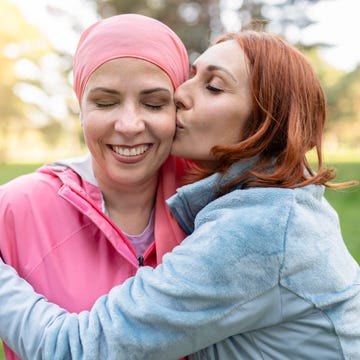Load up on plant food. Use your gym membership. Apply sunscreen religiously. Steer clear of cigarettes. Taking on healthy behaviors like these is supposed to lower your lifetime cancer risk. Now, along comes a bombshell study that seems to suggest many of these odds-lowering efforts are less impactful than you may have previously thought: The study, from Johns Hopkins University, determined that two-thirds of all adult cancer incidences can be attributed to random gene mutations that drive tumor growth. In other words, most incidences of cancer are caused by plain-old bad luck, according to study authors.
The study came about because researchers wanted to understand why some body tissues, such as those in the small intestine and pancreas, have higher cancer risk rates than others. So they tracked the number of stem cell divisions that happen across 31 tissue types, comparing these figures with the lifetime risks of cancer in these same tissues among American adults. The conclusion: The higher the number of cell divisions the tissue endures, the higher the cancer risk rate was. “Our study shows, in general, that a change in the number of stem cell divisions in a tissue type is highly correlated with a change in the incidence of cancer in that same tissue,” said study investigator Bert Vogelstein, M.D., the Clayton Professor of Oncology at the Johns Hopkins University School of Medicine, in a news release. The more cell divisions that happen, the greater the chance that a random mutation occurs—and malignancy develops.
So should you throw in the towel when it comes to healthy living since the study results imply that cancer is mostly out of your hands? That would be a resounding no. Though the researchers identified 22 cancer types with risk rates largely driven by random mutations, nine others—such as one type of skin cancer as well as head and neck, colorectal, and lung cancer—were tied to environmental factors you can at least partially control, in this case exposure to UV rays and smoking. These nine were also influenced by hereditary factors, which means that regular screenings can help you ID a tumor before it becomes life-threatening. Also, if you’re worried about breast cancer, this study offers no answers, as researchers didn’t look at breast tissue at all (luckily, this does).
The other thing is, “random” mutations aren’t necessarily random at all, says David Katz, M.D., M.P.H, director of the Yale University Prevention Research Center. Instead, they may arise as a result of lifestyle factors. “Mutation rates are higher in those exposed to toxins and lower in those exposed to health-promoting conditions,” says Katz. “Studies have already shown that cancer-promoter genes are turned off and cancer-suppressor genes turned on by healthy living; this doesn't change that."
RELATED: 10 Cancer Symptoms Most People Ignore
Bottom line: Cancer is a collection of diseases caused in varying degrees by genetics, environmental factors, and the random gene mutations cited in the Johns Hopkins study. Since some cancers offer more leeway than others for you to reduce your odds, it’s smart to adopt healthy behaviors that could do just that: Stick to a diet low in animal fat and high in fruits and veggies, get regular physical activity, and minimize your exposure to UV rays and cigarettes, suggests the American Cancer Society.
RELATED: See a Doctor if Your Pee Looks, Smells, or Feels Like This













